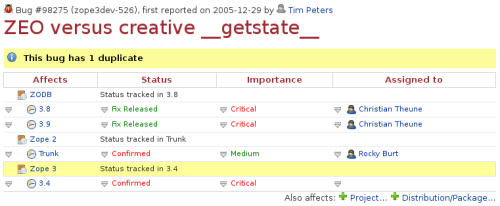Launchpad Help > Bugs > Your project
Overview
Launchpad's bug tracker is unique: it can track how one bug affects different communities.
When you share free software, you share its bugs. This means that free software bugs may be reported in one project but originate in another entirely, whilst affecting several more.
Launchpad handles this by making every bug available to every project and distribution that uses the bug tracker. Rather than treating each project as an island, with an isolated list of bug reports, Launchpad allows interested groups to work together in search of a fix.
Bug 98275 is a great example. It is one bug report, with one bug number, but it has a different status, importance and assignee in each context.
|
This bug affects different projects and series |
This table appears at the top of the bug report, showing that it affects three projects and different series (lines of development towards a release) within those projects. In this case, each of the affected projects uses Launchpad's bug tracker. However, Launchpad can just as happily monitor the progress of the same bug in external trackers, as shown in bug 122590.
|
Watching a bug tracked elsewhere |
Here, the bug report in Launchpad is about Ubuntu's package of the Gnome Panel. However, there's also a link to the bug as tracked in Gnome's Bugzilla, along with its status there. This lets the Ubuntu desktop bugs team monitor the progress upstream and implement their fix when it becomes available.
Getting started
When you registered your project in Launchpad, you had the option to specify where its bugs are tracked. If you chose an option other than Bugs are tracked in Launchpad, you now need to activate the Launchpad bug tracker for your project.
Follow the Change details link on your project's overview page.
|
Choosing Launchpad as your bug tracker |
You can also choose whether Launchpad should automatically expire inactive bugs. There's more on what Launchpad considers an inactive bug in our article on bug expiry.
Importing your existing bug history
In some cases, the Launchpad team can import your existing bug history from another bug tracker. This may mean you can switch to Launchpad's bug tracker without having to maintain your previous bug tracker in a read-only mode.
Get in touch to see if we can help.
Bug supervisors
bug supervisor: handles day to day management and triage
Many projects create specific teams to act as the bug supervisor, allowing several people to triage bugs without gain.
If you'd prefer not to set these - perhaps because your project is small enough not to need specific contacts - you, as project owner, take them by default.
The bug supervisor's role
You may want to give some people extra bug editing privileges: The bug supervisor's role is to manage the planning of bug work and the triage of newly reported bugs.
Launchpad helps them do this by giving them access to:
- target bugs to a milestone
- set the importance of a bug
set certain bug statuses.
To set your project's bug supervisor, visit its bug overview page - for example: https://bugs.launchpad.net/inkscape - then choose the edit link next the the bug supervisor role listed on the page.
Next step
Now you've set up the basics, you're ready to start managing your project's bug reports in Launchpad. However, let's first look at how Launchpad tracks the hottest bugs.


